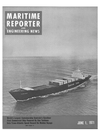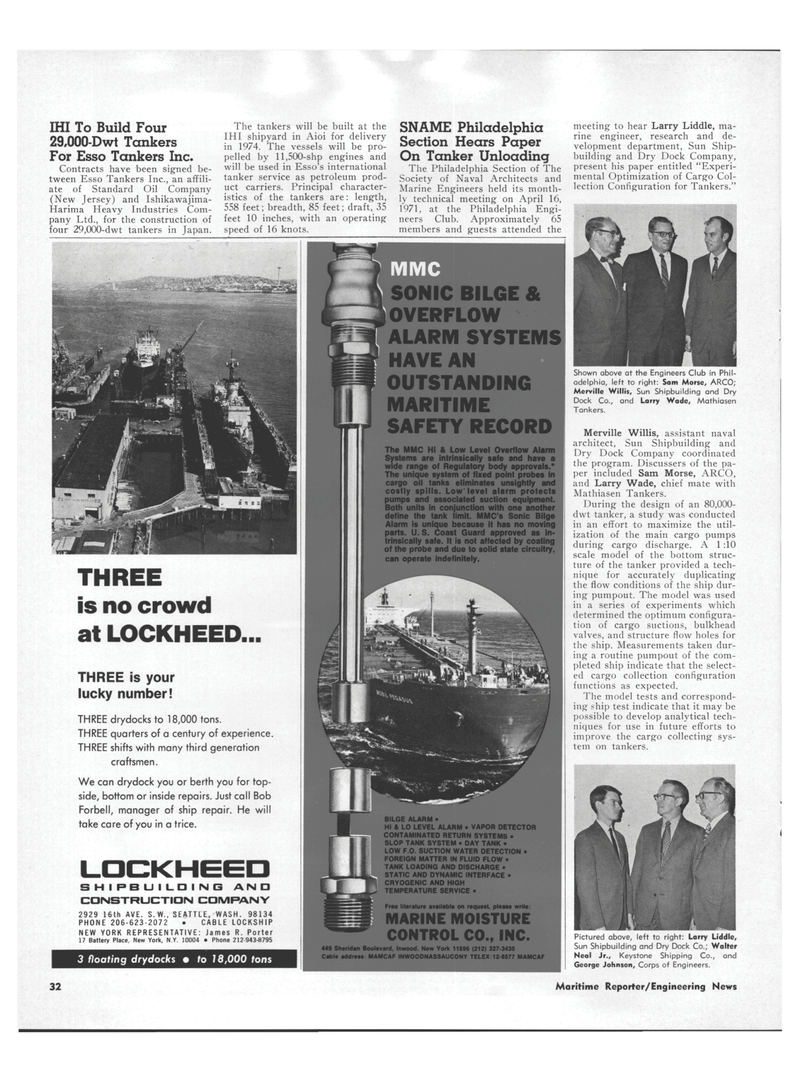
Page 30: of Maritime Reporter Magazine (June 1971)
Read this page in Pdf, Flash or Html5 edition of June 1971 Maritime Reporter Magazine
3 floating drydocks • to 18,000 tons
IHI To Build Four 29,000-Dwt Tankers
For Esso Tankers Inc.
Contracts have been signed be- tween Esso Tankers Inc., an affili- ate of Standard Oil Company (New Jersey) and Ishikawajima-
Harima Heavy Industries Com- pany Ltd., for the construction of four 29,000-dwt tankers in Japan.
The tankers will be built at the
IHI shipyard in Aioi for delivery in 1974. The vessels will be pro- pelled by 11,500-shp engines and will be used in Esso's international tanker service as petroleum prod- uct carriers. Principal character- istics of the tankers are: length, 558 feet; breadth, 85 feet; draft, 35 feet 10 inches, with an operating speed of 16 knots.
SNAME Philadelphia
Section Hears Paper
On Tanker Unloading
The Philadelphia Section of The
Society of Naval Architects and
Marine Engineers held its month- ly technical meeting on April 16, 1971, at the Philadelphia Engi- neers Club. Approximately 65 members and guests attended the
THREE is no crowd at LOCKHEED...
THREE is your lucky number!
THREE drydocks to 18,000 tons.
THREE quarters of a century of experience.
THREE shifts with many third generation craftsmen.
We can drydock you or berth you for top- side, bottom or inside repairs. Just call Bob
Forbell, manager of ship repair. He will take care of you in a trice.
LOCKHEED
SHIPBUILDING AND
CONSTRUCTION COMPANY 2929 16th AVE. S.W., SEATTLE. WASH. 98134
PHONE 206-623-2072 . CABLE LOCKSHIP
NEW YORK REPRESENTATIVE: James R. Porter 17 Battery Place, New York, N Y. 10004 • Phone 212-943-8795
SONIC BILGE &
VERFLOW
ALARM SYSTEMS
HAVE AN
OUTSTANDING
MARITIME
SAFETY RECORD 449 Sheridan Boulevard. Inwood, New York 11696 (212) 327-3430
Cable address: MAMCAF INWOODNASSAUCONY TELEX: 12-6577 MAMCAF
Free literature available on request, pleaae write:
MARINE MOISTURE
CONTROL CO., INC.
The MMC Hi & Low Level Overflow Alarm
Systems are intrinsically safe and have a wide range of Regulatory body approvals.*
The unique system of fixed point probes in cargo oil tanks eliminates unsightly and costly spills. Low'level alarm protects pumps and associated suction equipment.
Both units in conjunction with one another define the tank limit. MMC's Sonic Bilge
Alarm is unique because it has no moving parts. U. S. Coast Guard approved as in- trinsically safe. It is not affected by coating of the probe and due to solid state circuitry, can operate indefinitely.
BILGE ALARM •
HI « LO LEVEL ALARM • VAPOR DETECTOR
CONTAMINATED RETURN SYSTEMS •
SLOP TANK SYSTEM • DAY TANK •
LOW F.O. SUCTION WATER DETECTION •
FOREIGN MATTER IN FLUID FLOW •
TANK LOADING AND DISCHARGE •
STATIC AND DYNAMIC INTERFACE •
CRYOGENIC AND HIGH
TEMPERATURE SERVICE • meeting to hear Larry Liddle, ma- rine engineer, research and de- velopment department, Sun Ship- building and Dry Dock Company, present his paper entitled "Experi- mental Optimization of Cargo Col- lection Configuration for Tankers."
Shown obove at the Engineers Club in Phil- adelphia, left to right: Sam Morse, ARCO;
Merville Willis, Sun Shipbuilding and Dry
Dock Co., and Larry Wade, Mathiasen
Tankers.
Merville Willis, assistant naval architect, Sun Shipbuilding and
Dry Dock Company coordinated the program. Discussers of the pa- per included Sam Morse, ARCO, and Larry Wade, chief mate with
Mathiasen Tankers.
During the design of an 80,000- dwt tanker, a study was conducted in an effort to maximize the util- ization of the main cargo pumps during cargo discharge. A 1 :10 scale model of the bottom struc- ture of the tanker provided a tech- nique for accurately duplicating the flow conditions of the ship dur- ing pumpout. The model was used in a series of experiments which determined the optimum configura- tion of cargo suctions, bulkhead valves, and structure flow holes for the ship. Measurements taken dur- ing a routine pumpout of the com- pleted ship indicate that the select- ed cargo collection configuration functions as expected.
The model tests and correspond- ing ship test indicate that it may be possible to develop analytical tech- niques for use in future efforts to improve the cargo collecting sys- tem on tankers.
Pictured above, left to right: Larry Liddle,
Sun Shipbuilding and Dry Dock Co.; Walter
Neal Jr., Keystone Shipping Co., and
George Johnson, Corps of Engineers. 32 Maritime Reporter/Engineering News

 29
29

 31
31
